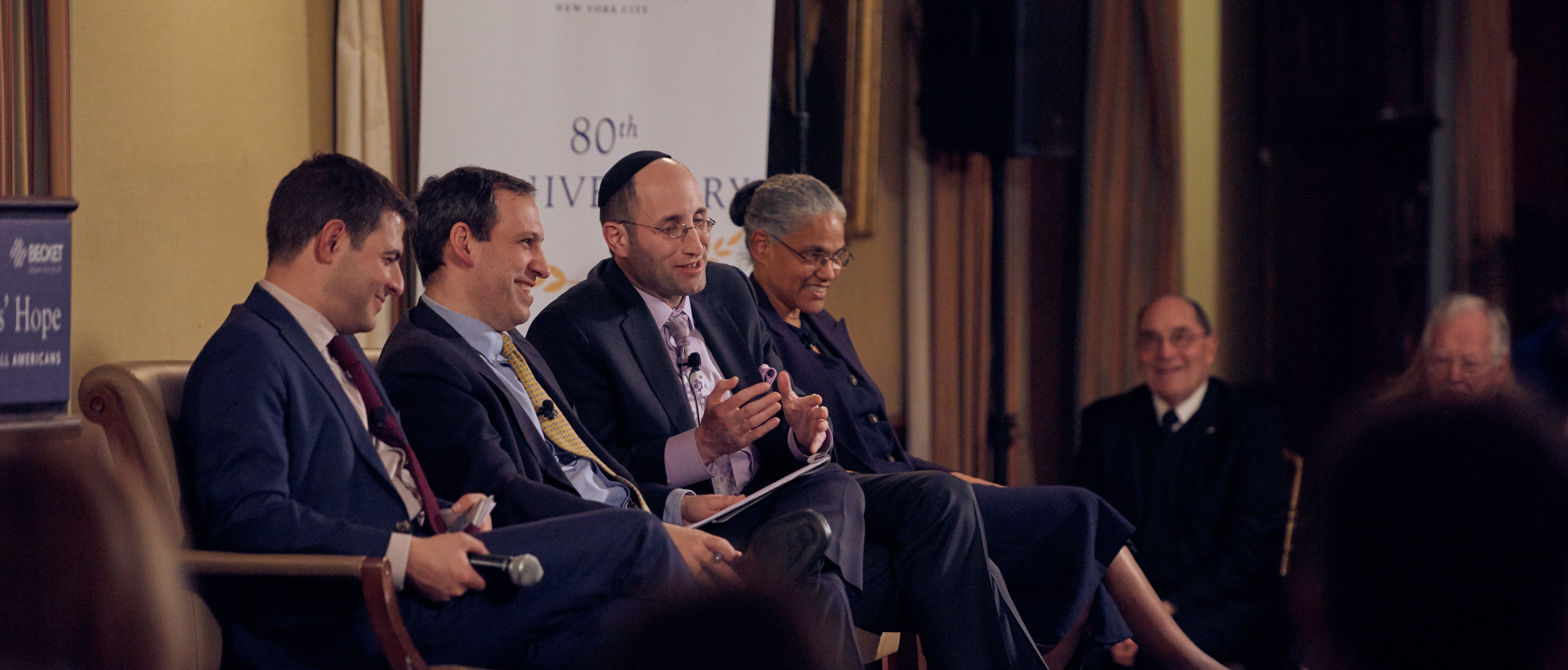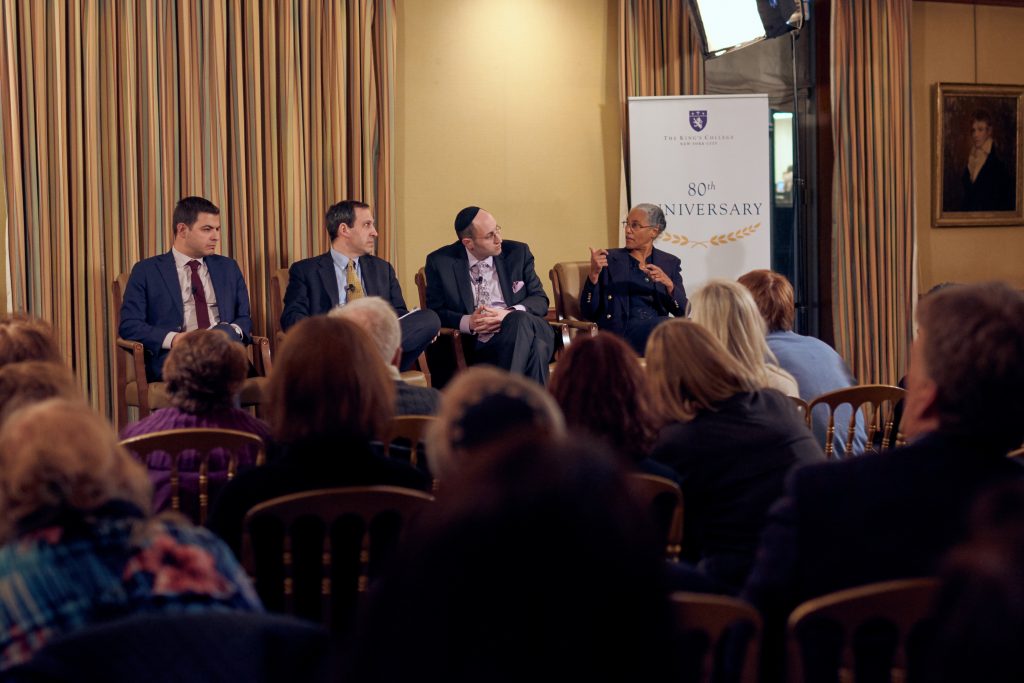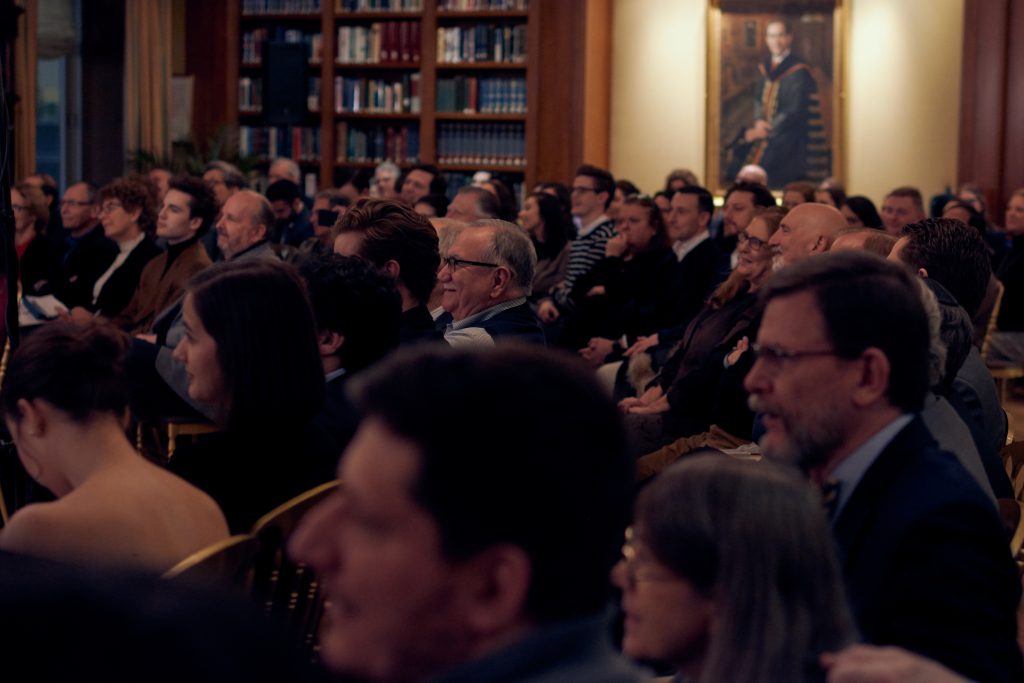The King’s College and The Becket Fund Host Panel on the Founders’ Hope for Religious Liberty in America
Panelists agreed that the rise of secular liberalism has threatened to separate the traditional conception of rights from its biblical roots.

On Wednesday, February 27, The King’s College and The Becket Fund for Religious Liberty co-sponsored a panel discussion at the Princeton Club in Manhattan. Panelists included Sohrab Ahmari, op-ed editor of the New York Post and contributing editor of the Catholic Herald; Mark Rienzi, President and Head of Litigation for Becket; Dr. Jacqueline Rivers, lecturer at Harvard University and executive director of the Seymour Institute on Black Church and Policy Studies; and Rabbi Dr. Meir Y. Soloveichik, director of the Zahava and Moshael Straus Center for Torah and Western Thought at Yeshiva University. The discussion on the future of religious liberty in America was moderated by Dr. Joseph Loconte, associate professor of history and Senior Fellow in Christianity and Culture at The King’s College.
In discussing the so-called culture wars between religious conservatives and social progressives, all panelists agreed that the future of religious liberty is by no means guaranteed. In fact, the rise of secular liberalism has threatened to separate the traditional conception of rights from its biblical roots. Though our Founders recognized that unalienable God-given rights are rooted in reason, natural law, and concomitant duties, modern progressives would have rights begin and end with the state.
According to Sohrab Ahmari, religious conservatives have been fighting a rear guard action since the Supreme Court decision in Obergefell v. Hodges (2015). Since the legal status of gay marriage is no longer up for debate, religious conservatives have refocused their efforts on the protection of conscience, that is, their ability to live according to their faith. Unfortunately, Masterpiece Cakeshop v. Colorado Civil Rights Commission (2017) and other cases surrounding transgender bathroom policy have proven that progressives are willing to go on the offensive to ensure their ideology is codified into law. Though the current scope of the religious liberty movement is narrower than before, Ahmari affirms that these legal battles are worth having, and worth winning.
Mark Rienzi echoed this call to action, saying that disagreement on important issues is a natural consequence of our free republic. Politics would be easier and more comfortable if government would dictate the answers for us, but we would lose our liberty in the process. Therefore, learning to coexist with our neighbor despite serious disagreements is essential to maintaining a democratic republic. Rienzi says we should never turn back the clock to the authoritarianism of centuries past. Instead, we should seek to live up to the values of the U.S. Constitution. “Embodied in the freedoms of the First Amendment,” Rienzi said, “is a love-thy-neighbor or a live-and-let-live approach.” Our country has not always lived up to this ideal, added Rienzi, but we have gotten better over time.
Rabbi Dr. Meir Y. Soloveichik spoke on the importance of religious liberty for cultural renewal. “As long as our culture is hostile to faith,” he said, “the future of faith itself in America is utterly insecure.” He points to Sen. Dianne Feinstein’s (D-Calif.) interrogation of a judicial appointee on his membership in the Knights of Columbus, a Catholic organization, as evidence that American culture is becoming increasingly opposed to organized religion in general. By contrast, so much of optimism, hope, and the willingness to sacrifice – civic virtues necessary for political liberty – are predicated on faith in something greater than ourselves. The future of America, Soloveichik claimed, depends on our ability to convincingly advocate for the role of faith in the public square.
Dr. Jacqueline Rivers explored the relationship between religious liberty and the African-American civil rights movement. She pointed to Dr. Martin Luther King as a religious leader who harnessed the transformative power of faith to enact social change. According to Dr. Rivers, King’s successes and the legislative victories of the civil rights movements were really victories of historically Black churches. These churches played a major role in organizing and inspiring hope in their congregations. Therefore, contrary to the beliefs of radical progressives, religious liberty was and is inseparable from the movement for racial justice. Moreover, these churches continue to serve the poor and needy in their local communities, often filling the gap left by insufficient public services.
Becket is the preeminent law firm defending religious freedom in the United States, known for the landmark Supreme Court victories Burwell v. Hobby Lobby (2014); The Little Sisters of the Poor in Zubik v. Burwell (2016); and Hosanna-Tabor v. EECO (2012), named the most important religious liberty case in a half-century by the Wall Street Journal.






